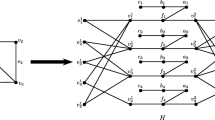Abstract
In this paper we consider r-dominating cliques in homogeneously orderable graphs (a common generalization of dually chordal and distancehereditary graphs) and their relation to strict r-packing sets. We give a simple criterion for the existence of r-dominating clique and show that the cardinality of a maximum strict r-packing set equals the cardinality of a minimum r-dominating clique provided the last parameter exists and is not two. Finally we present two efficient algorithms. The first one decides whether a given homogeneously orderable graph has a r-dominating clique and, if so, computes both a minimum r-dominating clique and a maximum strict r-packing set of the graph. The second one computes a minimum connected r-dominating set in this graph.
First author supported by DAAD. Second author supported by DFG.
Preview
Unable to display preview. Download preview PDF.
Similar content being viewed by others
References
A. Brandstädt, Special graph classes — a survey, Technical Report Universität Duisburg SM-DU-199, 1991.
A. Brandstädt and F.F. Dragan, A Linear-Time Algorithm for Connected r-Domination and Steiner Tree on Distance-Hereditary Graphs, Technical Report Universität Duisburg SM-DU-261, 1994.
A. Brandstädt, V.D. Chepoi and F.F. Dragan, The algorithmic use of hypertree structure and maximum neighbourhood orderings, International Workshop ”Graph-Theoretic Concepts in Computer Science” 1994, to appear.
A. Brandstädt, F.F. Dragan and F. Nicolai, Homogeneously orderable graphs, Technical Report Universität Duisburg SM-DU-271, 1994.
A. Brandstädt and D. Kratsch, Domination problems on permutation and other graphs, Theoretical Computer Science 54 (1987), 181–198.
F.F. Dragan, HT-graphs: centers, connected r—domination and Steiner trees, Computer Science Journal of Moldova 1 (1993), No. 2, 64–83.
F.F. Dragan, Dominating cliques in distance-hereditary graphs, Proc. of the 4th SWAT, Aarhus, Denmark, Springer LNCS 824 (1994), 370–381.
F.F. Dragan and A. Brandstädt, r-dominating cliques in Helly graphs and chordal graphs, Proc. of the 11th STACS, Caen, France, Springer LNCS 775 (1994), 735–746.
M.C. Golumbic, Algorithmic Graph Theory and Perfect Graphs, Academic Press, New York 1980.
S.C. Hedetniemi and R. Laskar (eds.), Topics on domination, Annals of Discr. Math. 48 (1991), North-Holland.
D. Kratsch, P. Damaschke and A. Lubiw, Dominating cliques in chordal graphs, Discr. Math. 128 (1994), 269–275.
Author information
Authors and Affiliations
Editor information
Rights and permissions
Copyright information
© 1995 Springer-Verlag Berlin Heidelberg
About this paper
Cite this paper
Dragan, F.F., Nicolai, F. (1995). r-Domination problems on homogeneously orderable graphs. In: Reichel, H. (eds) Fundamentals of Computation Theory. FCT 1995. Lecture Notes in Computer Science, vol 965. Springer, Berlin, Heidelberg. https://doi.org/10.1007/3-540-60249-6_52
Download citation
DOI: https://doi.org/10.1007/3-540-60249-6_52
Published:
Publisher Name: Springer, Berlin, Heidelberg
Print ISBN: 978-3-540-60249-1
Online ISBN: 978-3-540-44770-2
eBook Packages: Springer Book Archive




